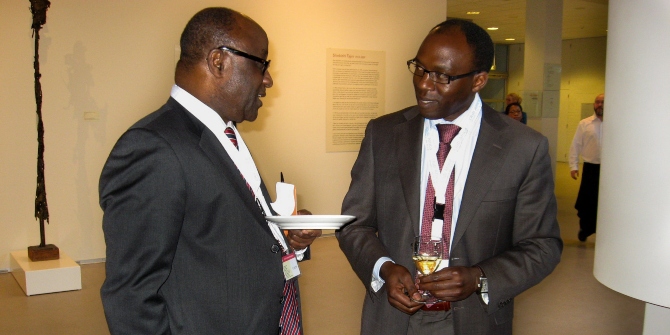Older people are a growing segment of the workforce in the developed world. They are vital for sustaining economic growth and innovation, yet few organisations value their skills, especially those of older women. Nearly one-third of women workers anticipate leaving their jobs before retirement age, not by choice, but due to health or wellbeing issues. Lucy Kallin writes that this talent drain calls for a re-evaluation of workplace policies.
Recent findings highlight a stark reality: women need to work an extra 19 years compared to men to close the gender pension gap. They face a £136,000 shortfall in pension savings at retirement age compared to an average man’s £205,000 pension pot. This financial chasm forces many women to choose between continuing to work well past retirement age or face a retirement of financial insecurity.
The pandemic has exacerbated these challenges, with women over 65 finding it particularly difficult to recover from employment losses. The disparity is rooted in biases, including the gender pay gap and gendered ageism, which negatively impact women’s earnings and career progression, especially as they age. Societal attitudes further marginalise older women by devaluing their experience and capabilities.
Applying an intersectional lens, we see that ageism, intertwined with other identity aspects like race, sexual orientation, class, and ability, further alienates older women.
Yet, as the working population ages, particularly in developed countries, this issue cannot be ignored. Japan, Italy, and Finland are seeing a significant rise in their elderly populations, with Europe’s median age projected to reach 48 by 2050.
Despite this shift, too few organisations are prioritising the skills of older workers into their talent system. A global survey found that fewer than four per cent of firms were running such programmes and only a quarter said they are “very likely” to in the future.
This growing workforce segment is vital for sustaining economic growth and innovation. Yet, nearly one-third of women workers anticipate leaving their jobs before retirement age, not by choice, but due to health or wellbeing issues, including the menopause. This worrying talent drain, compounded by societal pressures on women to meet unrealistic beauty standards and balance caregiving responsibilities, calls for a re-evaluation of workplace policies.
For women in physically demanding roles, like café servers, online grocery pickers, or retail workers, continuing in the same capacity may also not be viable due to health constraints. No woman should have an expiry date.
However, continuing to work can seem insurmountable for many. One-third of workers perceive a rise in negative attitudes towards older employees since the cost of living crisis and more than half of those over 50 have experienced age discrimination in the past year.
Women leaders are also exiting their roles at an alarming rate. A 2022 study revealed that for every woman promoted at the director level, two opt to leave their company. It’s time we faced these challenges head on. And that requires cultural shifts inside and outside of workplaces.
“While men become wells of wisdom as they age, older women are seen as outdated, harpy, strident,” a woman told a study. “Our voices are discounted.” Another retirement-aged woman in the same study said, “I am largely ignored.”
Dispelling myths about older workers’ capabilities is critical. Far from being resistant to change, many seek out reskilling and upskilling opportunities and remain committed to their professional growth. Older workers also report higher job satisfaction levels and can play a pivotal role in creating a more inclusive and harmonious work environment.
The loss of valuable knowledge and intellectual property due to the marginalisation of older women is hugely detrimental. Yet, less than 10 per cent of companies consider age in their diversity initiatives, overlooking the vast contributions older workers offer.
Organisations must adapt and recognise the changing needs and priorities of older workers, with flexible working top of the list. This is the ‘sandwich generation’ wedged between supporting elderly relatives and providing childcare for grandchildren. Indeed, women are nearly three times more likely to have retired early from the workplace to provide care for a family member (14 per cent of female early retirees, compared with five per cent of men) according to a recent study.
As less of the younger generation are entering the market, It is time for organisations to become an attractive employer of choice for older workers. Flexible work arrangements, carer’s leave and supportive measures for health issues like the menopause are essential requirements.
Some organisations are leading the way, including Mitsubishi Corporation, which has created a Career Design Centre exclusively for employees aged 60 and older, offering training and one to one consultation sessions with senior workers. Tokyo Gas also gives career development support and mentoring to its employees over 50. It states that more than 90 per cent of its workers facing mandatory retirement were rehired by the company or its subsidiaries.
Another company forging a clear pathway for older workers is the AXA Group, which has signed, together with the European Works Council, a charter of 10 commitments aimed at enhancing the role and place of employees over the age of 50 in the company.
We are at a crossroads in how to sustain future economies.
Talented women leaders leaving the workforce, the discrimination faced due to age and appearance, and the struggle to balance caregiving responsibilities highlight a clear message: the current system fails to recognise the invaluable contributions of older women.
Women do not have a sell-by date. Older women workers, including those who actively want to stay economically active, are having choice taken away from them. Age should never be a factor in hiring, making promotion decisions or bringing on new team members for a growth opportunity. Leaders should focus on each woman’s skills, not their tenure or external demands.
It is time for organisations to prioritise creating environments where older women can thrive, treating age as a critical diversity aspect and combating ageism with the same attention and focus as other biases. Women’s knowledge, experience and leadership are invaluable assets that need to be recognised.
- This blog post represents the views of the author(s), not the position of LSE Business Review or the London School of Economics and Political Science.
- Featured image provided by Shutterstock
- When you leave a comment, you’re agreeing to our Comment Policy.





